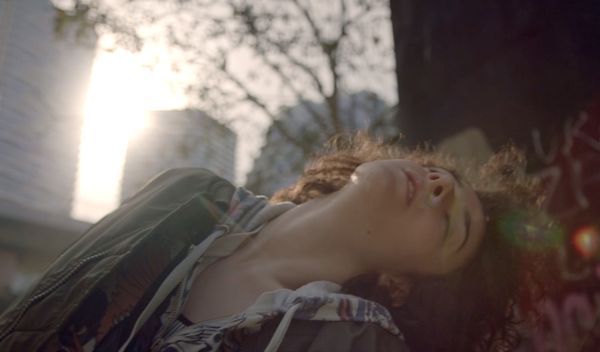Eye For Film >> Movies >> Ghosts (2020) Film Review
Ghosts
Reviewed by: Amber Wilkinson

Azra Deniz Okyay gets down to street level in Istanbul for her debut feature Ghosts. Set in the very near future, at the time of writing - October 26, 2020, to be exact - she follows the course of a single day on the brink of a national power outage from different perspectives, considering not just the people but the shifting situation for the fabric of the city itself.
This is not simply a case of seeing the same events from a different angle, although there are a number of cross-overs - the timeline is also slippery, so that sometimes we move forward and back until the full picture emerges. The film is as much about disconnection as connection as radio adverts for "The New Residences - built to give a wonderful new life in modern Turkey" are in sharp contrast to the actual experiences on the ground, with the news report suggesting "Istanbul has been turned into a war zone" of protest.

Okyay's female-centric narrative, chiefly tracks two women - young dancer Didem (Dilayda Günes, making a big impact in her first film role) and the older Iffet (Nalan Kuruçim), who is desperately trying to get money together to help her son in prison. Like all the characters in the film, they live in the same neighbourhood and their paths will cross more than once. Lesser, but still significant, characters, include feminist activist Ela (Beril Kayar) and Rasit (Emrah Ozdemir) - the chief male character of the piece - whose life is largely spent as a fixer for inscrupulous landlords and business developers.
Events include a dance contest, a protest and a smuggling plan but they're all firmly embedded in the current sociopolitical situation in Turkey - where bright words about a shiny future contrast sharply with the reality under president Tayyip Erdogan's rule. Okyay generates an oppressive and misogynistic atmosphere, the latter epitomised by an early scene in which a male employer berates Didem for dancing and sacks her but fully expects her to finish cleaning his room before she leaves. There's also a sense of what might be considered 'everyday surveillance' as the film is cut with snippets of mobile phone footage being taken by characters within a film. "Are those men shooting us?" one woman asks, implying a level of threat that goes beyond a lens.
The film is built on these sort of small but significant moments that will also see Syrian refugees being ripped off for accommodation or rules being dangerously flouted in a bid to gentrify a building. Oyay also gives a feel for the way some oppressive attitudes have been internalised, so that while Didem is largely a free spirit, she still turns on a younger girl for wearing "lipstick at your age!". Though the metaphor of a descent into darkness is on the obvious side, the issues surrounding gentrification and disenfranchisement bite deep. Shot with a fluid intimacy by cinematographer Baris Özbiçer, Oyay's film gathers momentum and an increasingly punk energy as it goes, as she shows the rich tapestry of a city that despite its surface problems also has a thriving underground alternative scene. It might not be an entirely hopeful film but it is one that believes deeply in the strength of the city's residents to maintain their resilience in the face of trouble.
Reviewed on: 08 Sep 2020















